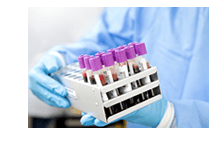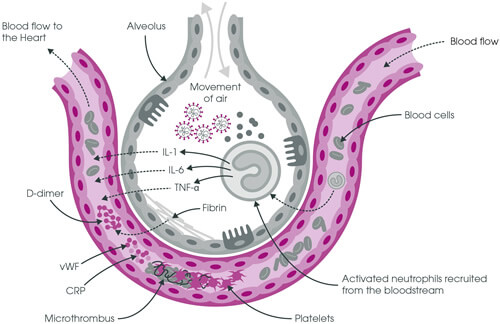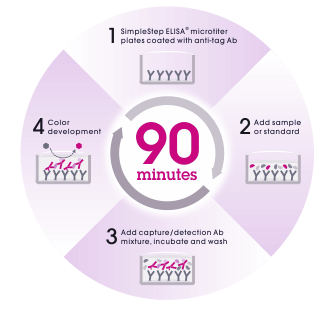|
COVID-19 血液生物標記檢測產品特輯
|
O 型血的人比較不容易感染 SARS-CoV-2?
|
 去年三月中國南方科技大學王鵬教授所率領的團隊線上發表了一篇血型與 COVID-19 關連性的研究報告,他們分析比對了 1,775 位來自武漢金銀潭醫院的 COVID-19 確診病患與 3,694 位健康常人的血型分布比例,統計結果顯示 O 型血的人最不易感染 COVID-19,而 A 型血的人則是在四種血型中具有最高的感染風險。該論文目前已刊登在《Clinical Infectious Diseases》期刊 [1]。 去年三月中國南方科技大學王鵬教授所率領的團隊線上發表了一篇血型與 COVID-19 關連性的研究報告,他們分析比對了 1,775 位來自武漢金銀潭醫院的 COVID-19 確診病患與 3,694 位健康常人的血型分布比例,統計結果顯示 O 型血的人最不易感染 COVID-19,而 A 型血的人則是在四種血型中具有最高的感染風險。該論文目前已刊登在《Clinical Infectious Diseases》期刊 [1]。
為什麼 O 型血的人具有較低的 COVID-19 感染風險與重症比例呢?愛爾蘭皇家外科醫學院的 James O'Donnell 教授等人提出了以下看法,他們認為有可能是因為 O 型血的人血液中的溫韋伯氏因子 (von Willebrand factor, VWF) 的含量比其他血型的人少了 20-30%,進而帶動了血液中第八凝血因子 (Factor VIII) 含量的降低,從而減輕 SARS-CoV-2 感染後造成的凝血異常與血栓風險 [2]。另一方面,義大利比薩大學附設醫院的 Daniele Focosi 博士則認為可能與 O 型血血液中含有的抗 A 抗體產生保護作用有關 [3]。
然而有關血型與 COVID-19 易感性 (susceptibility)、疾病嚴重程度或死亡率的相關性探討,至今年七月為止其實都還沒有共識,充滿了歧異甚至矛盾的觀點 [4-11]。或許就像西班牙那瓦拉醫院的 Saioa Zalba Marcos 醫師等人所指出的,血型在世界各地的分布比例不同,因此要想精準剖析血型與 COVID-19 之間的關連性,必須透過全球大規模化的科學實驗與統計數據分析,才能真正了解不同地理區域與種族間的差異性,以確認血型與 COVID-19 兩者間是否存在有真實的因果關係 [7]。
|
更多可能的 COVID-19 血液生物標記:凝血因子與細胞激素
|
相較於頗具爭議性的血型研究,學術和醫療界普遍認可血液中凝血因子和發炎反應相關蛋白質濃度的增加,是 COVID-19 重症與死亡率的危險因子。這些 COVID-19 血液生物標記 (blood-based biomarkers for COVID-19) 包含前文所提到的 VWF、血栓指標 D-二聚體 (D-dimer)、鐵蛋白 (Ferritin)、發炎指標 C-反應蛋白 (C-reactive protein, CRP) 以及免疫風暴 (cytokine storm) 相關細胞激素,例如 TNF-α, IL-1, IL-6 等等 [12-18]。

|
90 分鐘完成血液生物標記檢測 — Abcam SimpleStep ELISA® Kits
|
 Abcam 專利研發的 SimpleStep ELISA® kits 系列產品,能讓研究者在短短 90 分鐘內完成標準 sandwich ELISA 偵測實驗,並且不必擔心犧牲偵測靈敏度!SimpleStep ELISA® kits 採用 Abcam 專利 RabMAb® 重組兔源單株抗體作為核心元件,具備更強的親和力與專一性,能有效提升偵測靈敏度與產品批次穩定性,協助您更快取得精確與高再現性的定量檢測結果。 Abcam 專利研發的 SimpleStep ELISA® kits 系列產品,能讓研究者在短短 90 分鐘內完成標準 sandwich ELISA 偵測實驗,並且不必擔心犧牲偵測靈敏度!SimpleStep ELISA® kits 採用 Abcam 專利 RabMAb® 重組兔源單株抗體作為核心元件,具備更強的親和力與專一性,能有效提升偵測靈敏度與產品批次穩定性,協助您更快取得精確與高再現性的定量檢測結果。
下方表格中,為您整理出數款最受歡迎的 COVID 血液生物標記 SimpleStep ELISA® kits 產品。
| Product |
Sensitivity
(pg/ml) |
Range
(pg/ml) |
Cat. No. |
| Human CRP ELISA Kit (C-Reactive protein) |
5.36 |
18.75-1200 |
ab260058 |
| Human D-Dimer ELISA Kit |
2.36 |
4.69-300 |
ab260076 |
| Human IL-1ra ELISA Kit |
1.5 |
7.81-500 |
ab211650 |
| Human IL-6 ELISA Kit |
1.6 |
7.8-500 |
ab178013 |
| Human TNF alpha ELISA Kit |
4.32 |
15.63-1000 |
ab181421 |
| Human Von Willebrand Factor ELISA Kit |
0.079 |
0.469-30 |
ab223864 |
除此之外,伯森生技還提供專業便利的【ELISA 實驗代工服務】,讓您可以省下人員訓練時間與儀器設備經費,更加專注投入於研究設計與策略擬定。若您有興趣進一步了解 SimpleStep ELISA® kits 或 ELISA 實驗代工服務內容,歡迎洽詢 Abcam 台灣代理 — 伯森生技(👨💻線上聯絡伯森業務專員)。您可透過下方連結瀏覽更多相關資訊:
References
- Zhao J, et al. Relationship Between the ABO Blood Group and the Coronavirus Disease 2019 (COVID-19) Susceptibility. Clin Infect Dis. 2021 Jul 15;73(2):328-331.PMID: 32750119
- O'Sullivan JM, et al. More on 'Association between ABO blood groups and risk of SARS-CoV-2 pneumonia'. Br J Haematol. 2020 Jul;190(1):27-28. PMID: 32420611
- Focosi D. Anti-A isohaemagglutinin titres and SARS-CoV-2 neutralization: implications for children and convalescent plasma selection. Br J Haematol. 2020 Aug;190(3):e148-e150. PMID: 32516462
- Wu BB, et al. Association between ABO blood groups and COVID-19 infection, severity and demise: A systematic review and meta-analysis. Infect Genet Evol. 2020 Oct;84:104485. PMID: 32739464
- Kabrah SM, et al. Systematic review and meta-analysis of the susceptibility of ABO blood group to COVID-19 infection. Transfus Apher Sci. 2021 May 21:103169. PMID: 34045120
- Ray JG, et al. Association Between ABO and Rh Blood Groups and SARS-CoV-2 Infection or Severe COVID-19 Illness : A Population-Based Cohort Study. Ann Intern Med. 2021 Mar;174(3):308-315. PMID: 33226859
- Zalba Marcos S, Antelo Caamaño ML, García-Erce JA. Reply to letter to the editor: "Infection and thrombosis associated with COVID-19: Possible role of the ABO blood group". Med Clin (Engl Ed). 2021 Aug 7. PMID: 34401518
- Krokhin AA, et al. ABO blood type analysis of the donors of convalescent plasma after COVID-19 infection in Chelyabinsk region, Russia. Vox Sang. 2021 Jul 15. PMID: 34268789
- Franchini M, et al. ABO blood group and COVID-19: an updated systematic literature review and meta-analysis. Blood Transfus. 2021 May 12;19(4):317–26. PMID: 34059188
- Lehrer S, Rheinstein PH. ABO blood groups, COVID-19 infection and mortality. Blood Cells Mol Dis. 2021 Jul;89:102571. PMID: 33894687
- de Freitas Dutra V, et al. Anti-A and SARS-CoV-2: an intriguing association. Vox Sang. 2021 May;116(5):557-563. PMID: 33650690
- Katzenschlager S, et al. Can we predict the severe course of COVID-19 - a systematic review and meta-analysis of indicators of clinical outcome? PLoS One. 2021 Jul 29;16(7):e0255154. PMID: 34324560
- Liu XQ, et al. Clinical characteristics and related risk factors of disease severity in 101 COVID-19 patients hospitalized in Wuhan, China. Acta Pharmacol Sin. 2021 Mar 19:1–12. PMID: 33742107
- Getu S, et al. Coagulopathy in SARS-CoV-2 Infected Patients: Implication for the Management of COVID-19. J Blood Med. 2021 Jul 17;12:635-643. PMID: 34305416
- Zinellu A, et al. INR and COVID-19 severity and mortality: A systematic review with meta-analysis and meta-regression. Adv Med Sci. 2021 Jul 21;66(2):372-380. PMID: 34315012
- Della-Morte D, et al. Low level of plasminogen increases risk for mortality in COVID-19 patients. Cell Death Dis. 2021 Aug 5;12(8):773. PMID: 34354045
- Hadid T, Kafri Z, Al-Katib A. Coagulation and anticoagulation in COVID-19. Blood Rev. 2021 May;47:100761. PMID: 33067035
- Henry BM, et al. Hematologic, biochemical and immune biomarker abnormalities associated with severe illness and mortality in coronavirus disease 2019 (COVID-19): a meta-analysis. Clin Chem Lab Med. 2020 Jun 25;58(7):1021-1028. PMID: 32286245
|



 去年三月中國南方科技大學王鵬教授所率領的團隊線上發表了一篇血型與 COVID-19 關連性的研究報告,他們分析比對了 1,775 位來自武漢金銀潭醫院的 COVID-19 確診病患與 3,694 位健康常人的血型分布比例,統計結果顯示 O 型血的人最不易感染 COVID-19,而 A 型血的人則是在四種血型中具有最高的感染風險。該論文目前已刊登在《Clinical Infectious Diseases》期刊 [1]。
去年三月中國南方科技大學王鵬教授所率領的團隊線上發表了一篇血型與 COVID-19 關連性的研究報告,他們分析比對了 1,775 位來自武漢金銀潭醫院的 COVID-19 確診病患與 3,694 位健康常人的血型分布比例,統計結果顯示 O 型血的人最不易感染 COVID-19,而 A 型血的人則是在四種血型中具有最高的感染風險。該論文目前已刊登在《Clinical Infectious Diseases》期刊 [1]。
 Abcam 專利研發的
Abcam 專利研發的